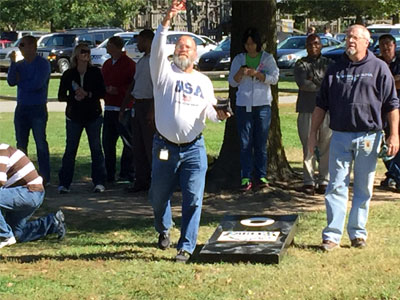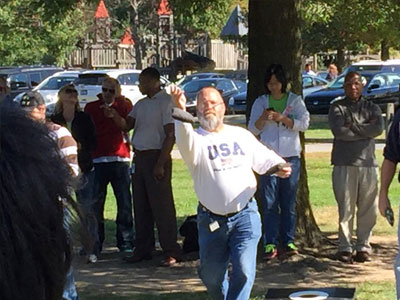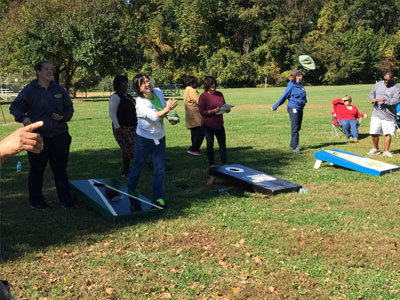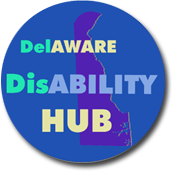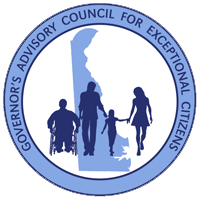Amy Haughey
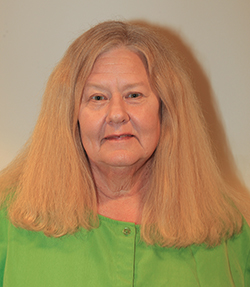
How did you get started working with people with disabilities?
Prior to coming to Delaware, my early career experiences were in residential treatment for court-adjudicated youth and then working as a part of a home-based family therapy team for a county mental health center. We saw many individuals with mental health issues in both settings and worked with lots of families who had a member with physical, emotional, intellectual or learning disabilities.
How long have you been involved in the Disability Community?
In a sense, all of my life because I have a sibling with a serious autoimmune disease as well as nephew who has a spectrum disorder. I really credit Mark Chamberlin (former Secondary Special Education Associate for DE DOE) for bringing me into the Delaware Disability Community through the Summer Institutes he held for teachers.
Where are you currently working and in what school district?
I am the 504 Compliance Officer for Smyrna High School and the Smyrna School District Transition specialist.
When did you become interested and advocating for individuals with disabilities?
I think it was as I became aware of the situations that many people with disabilities found themselves in and the difficulties they face with daily life. It felt inherently unfair to me that everyone in our society did (and still does not) have access to all of the things that they should to live a fulfilled life.
Where did you go to college and what was your major? How did your major influence the work you do advocating for individuals with disabilities?
My undergraduate work was at Pennsylvania State University. My major (Individual and Family Studies, with an emphasis on family development and relationships) and was an inter-disciplinary one that combined human development, social work, psychology, and sociology. My graduate work was at Wilmington University and the University of Delaware in Special Education.
My major led me to serve individuals and families and helped me to learn to look at all of the factors that can affect and individual or family, with disability being only one facet of the whole person.
Are you involved with any associations, agencies or organizations that advocate for people with disabilities? If so, which ones?
I served on the Board of Directors for C.E.R.T.S, Inc. for six years, the last three as Board President. I was involved in CEC/DCDT when there was an active chapter in our state and held several officer positions. I currently am a member of the Smyrna High School Wellness Center Advisory Board. I am also involved with the National Alliance for Partnerships in Equity as a part of a district work group. Our multi-year project is involved in examining the root causes of students with disabilities not enrolling/succeeding in Career/Technical Ed pathways and improving enrollment and outcomes. I am a part of the Community of Practice for Transition and a member of the DOE Transition Cadre.
What have you learned from working with people with disabilities?
I have reaffirmed my belief in the resilience of people to achieve, despite sometimes daunting odds. I have learned to measure success a little differently because what may be a small step for most people may be a huge step for a person with a disability. I think the most important thing is that we as a society look at disability as just one part of a person instead of being the thing that defines them as a person.
Can you describe a situation where you encouraged someone to advocate for himself or herself?
I have a current student who has a visual impairment. I suggested to him last year that he should consider applying to introduce speakers at the Delaware Transition Conference. Although he was very unsure, I kind of strong-armed him into it because I knew he would do a great job. He did a terrific job! He introduced again at this year's conference, has helped with the Kent County Transition Fair, did a video interview for DHSS on the Transition Conference, and has become quite an active self-advocate. I do not claim too much credit as he is an outstanding young man, an athlete, future special ed teacher and very active in Transition activities through DVI (Division of Visual Impairment). It is very exciting to see students become self-advocates and then share their knowledge with peers!
Can you describe some of the best methods to use when working with students/adults or child transitioning from school to work or college?
Best practice to me means really considering what the student's goals are, what the needs are, and helping connect them to the resources they need to be successful. Students need to learn and be given opportunities to use self-advocacy and self-determination skills. The student and parent need to be given the information they specifically need in order to be make educated decisions about, and plan for the future. It is vital to involve the student, family, and any community resources in the planning process and maintain good communication.
What are some barriers that transitioning youth encounter? What do you suggest to over come them?
I think that lack of knowledge, planning time, and resources can be major barriers. Students and families should be encouraged to start planning for their post-secondary future early as possible, regardless of whether the person is going on to post-secondary education, employment or training. Although some resources may be not applied for until a student graduates, they can still plan by becoming knowledgeable of the resources that exist, finding out eligibility requirements, and knowing when and how to apply. Knowledge is empowering!
What were you biggest challenges and accomplishments while working with people with disabilities?
I think that while we are trying as a society to expand opportunities for people with disabilities, there are still many barriers and limitations. It is a complex system which can be confusing for professionals and families to negotiate. One challenge we are working on as a state Transition cadre is trying to more effectively coordinate and share information between agencies in order to serve families more efficiently.
My biggest accomplishments are seeing the students who have gone on to achieve their goals and become successful adults. It thrills me to see them in careers, having families, and achieving educational dreams. For example, one of my former students with significant physical disabilities has gone on to become successful in college and has been asked to join a fraternal honor society. I was so excited because this student, although very bright, was getting so bogged down with the logistics and despair that he was ready to give up. I am so glad he persevered and has been able to achieve the things of which I knew he was capable.
What would you share with those with the same type of job that could inspire them?
Never give up, seek to change systems that do not serve us well, find the unique and wonderful qualities that your students possess, understand their family's situations and struggles, see strengths first, and...
ADVOCATE, ADVOCATE, ADVOCATE!
